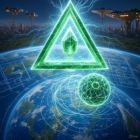What Happens When Energy Is No Longer Scarce
Since the dawn of civilization, energy scarcity has defined the limits of human development. From burning wood to coal, then oil, gas, and uranium — every leap in progress was constrained by how much energy we could harness, store, and distribute. Scarcity shaped wars, empires, economies, and even the geography of cities.
But now we’re on the cusp of something unthinkable: a world where energy is no longer a limiting factor.
Whether through nuclear fusion, thorium reactors, or massive solar grids with AI distribution, humanity is inching toward near-infinite clean energy. This future could redefine civilization as profoundly as the discovery of fire.
🏗️ Unlimited Energy Means Uncapped Innovation
Abundant, cheap, and clean energy could eliminate many of the friction points holding back innovation:
- Desalination of seawater becomes cheap, ending global water scarcity.
- Hyper-automated factories can run 24/7 with minimal human oversight.
- Vertical farming becomes mainstream, allowing food to be grown in urban skyscrapers.
- Supercomputing and AI training can operate without energy cost concerns.
- Deep space missions become practical with self-sustaining energy systems.
The cost of energy is embedded in everything — from food and housing to transportation and healthcare. If energy becomes practically free, entire industries could collapse and reemerge under radically new economics.
🌍 Geopolitical Earthquake
Many countries’ global influence is rooted in their control over energy exports — think OPEC, Russia, the U.S. shale industry, and China’s solar dominance.
In a world of infinite energy:
- Oil-exporting nations may face economic collapse unless they pivot.
- Energy independence becomes universal, diminishing strategic leverage.
- Decentralized energy production erodes centralized national grids and the political power tied to them.
- New global alliances may form based on data, rare materials, and AI — not fossil fuels.
In other words, power shifts from the oil barrel to the algorithm.
⚖️ The Double-Edged Sword of Abundance
While energy abundance offers hope, it also brings new risks and inequalities:
- Wealthy nations and corporations may gain access first, widening the global gap.
- Unregulated overproduction could accelerate climate damage in other ways, such as rare-earth mining or overuse of resources.
- Automation powered by unlimited energy may lead to massive job displacement in logistics, manufacturing, and services.
- Surveillance systems may flourish under governments that can now power AI-driven control infrastructures 24/7.
Without ethical frameworks and equitable distribution, abundant energy could just centralize power further — this time digitally and invisibly.
🧬 Scientific Renaissance or Ecological Collapse?
Abundant energy will supercharge science and exploration:
- Simulating entire ecosystems or human brains could become standard scientific practice.
- Long-term climate interventions like carbon capture at scale become affordable.
- The terraforming of Mars or the Moon might shift from fantasy to policy.
- Global wireless energy transmission could eliminate infrastructure gaps in developing regions.
Yet, even here, there’s a thin line between salvation and self-destruction. Abundant energy could also enable unchecked megaprojects that damage ecosystems irreversibly — from artificial weather systems to geoengineering experiments gone wrong.
🧠 Cultural and Psychological Impact
We underestimate how much scarcity shapes human psychology. A society built on abundance may not just look different — it may think and feel differently:
- Capitalism, as we know it, may evolve or collapse, no longer needed to manage scarcity.
- People might shift from work-based identities to creative or knowledge-driven fulfillment.
- Or conversely, existential boredom and inequality might trigger unrest in ways we’ve never seen.
When survival is no longer the game, what replaces it?
🔌 Energy Is Just the Beginning
Removing energy scarcity is like removing gravity — it doesn’t just change the rules, it rewrites them:
- Economies collapse and reconfigure.
- National borders lose meaning as energy becomes local.
- Work, time, and even relationships with nature and machines shift fundamentally.
This isn’t just a change in technology — it’s a change in civilization’s architecture.
🌐 Final Thought
A world without energy scarcity won’t be a utopia — but it could be the most radical transformation in human history. We are not just asking how to generate more energy — we are now asking: “What will we become once we have it?”
The answers may shape not only nations, but the very definition of being human.






